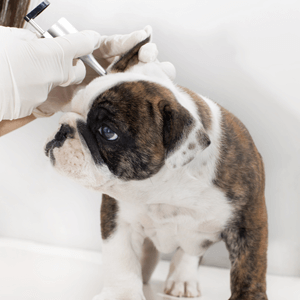Pet Ear Care
Ear Infections in Dogs and Cats:
An owner, a veterinarian, or a groomer often detects the first sign of an ear infection. Many will see their pet incessantly head shaking, or pawing or scratching at its ear(s). They may also notice a foul smell in and around the head or ears. Owners or groomers should notice an inflamed, red or irritated outer ear (pinna), excessive wax buildup, or pain sensitivity to touch during ear cleaning. Ear infections can be uncomfortable, irritating, or painful for your pet as he/she constantly tries to relief the itch by scratching while simultaneously groaning to vocalize discomfort.
Some of the symptoms to look for include:
- A distinct odor from one or both ears
- Swelling in and around the ear
- Color and appearance such as redness and irritated
- Constant pawing at the ear
- Head shaking or head tilt
- Painfull to touch (ear ache)
- Declined hearing
- Bumps or Rash
Once the problem is noticed and your pet is at the veterinarian for a physical exam, your veterinarian should check for all possible underlying problems including allergies and bacterial or fungal pathogens. As part of the ear exam, the veterinarian should look inside the ear canal with an otoscope to identify the presence of mites, foreign material, masses, and/or abnormal narrowing of the ear canal (termed stenosis). It also allows visualization of the integrity of the eardrum or the degree of damage if any. A video otoscope (camera attached) goes even further by showing a live feed of the video images inside the ear and helps with better visibility.
Some diseases of the ear include:
- Punctured or ruptured ear drum
- Yeast infection (fungal)
- Bacterial Infection
- Hematoma (pinnea swollen with fluid/blood)
- Ear mites
- Growth/Mass
- Allergy
Subsequent treatment is tailored specifically to the type of infection and the extent of damage to the ear canal and/or eardrum. Sometimes repeated infections are due to unresolved allergy problems and left untreated may become chronic.
Chronic repeated ear infections may cause irreversible damage to the ear canal in which case the best solution is to remove the ear canal entirely and close off the surrounding tissues with sutures so that the appearance is preserved. The surgical procedure to remove a diseased ear canal is called a Total Ear Canal Ablation (TECA). This surgical procedure is used as a treatment for chronic ear infections especially in the middle ear when the eardrum (tympanic membrane) is damaged. The chronic infections have already resulted in significant hearing loss, the TECA procedure does not restore it, but rather, prevent re-infection, and hence the overall quality of life for your pet is improved.
How to clean your pet's ears:
https://www.youtube.com/watch?v=vTygZTCXTmA
Learn more about pet ear care and ear infections:
https://parklandvet.blogspot.com/2014/06/ear-infection-in-your-dog-or-cat.html

